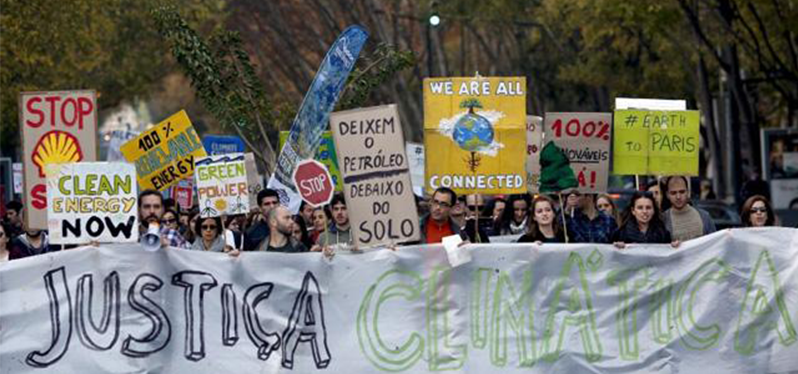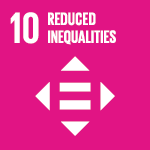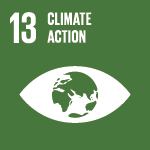Posted in: 03/16/2022
The process of raising awareness about climate change and the damage it causes to the environment has intensified in recent years.
With the effects of global warming and the concentration of greenhouse gases in the atmosphere, among other factors related to climate change, climate-related disasters are becoming increasingly evident and draw attention to what can happen to the future of the planet .
An example of the attention that the topic has been receiving was seen recently, during COP26, the UN Conference on Climate Change . Few times in the history of environmental movements and demonstrations against the degradation of the planet have we had such intense participation by young people, who held protests both in person (in Glasgow , where the event was being held) and around the world.
They were dedicated and spared no efforts to demand from governments, heads of state and world leaders the effective changes and the fulfillment of the environmental promises that have been made since COP21 and the Paris Agreement .
The involvement of younger generations had some effects on the process of raising awareness about climate change: in addition to a massive presence and dissemination of the topic on the internet, it stimulated intense coverage in the global press .
However, in this case, it is not possible to give credit only to the commitment of youth. Experts indicate that the greatest press coverage ever made for an environmental event such as COP26 may have had other reasons besides the demonstrations.
Proximity to the holding of the G20 summit was pointed out as one of the reasons for the increased presence of the press and the production of content about COP26. This is because at the G20 meeting, where important issues related to the global economy are discussed , discussions on climate change and sustainable development were given great emphasis.
It is worth noting that, together, the countries participating in the G20 concentrate 80% of the global GDP , and are responsible for 80% of greenhouse gas emissions on the planet. Therefore, it was important for the press to be attentive and monitor the behavior of these leaders in relation to the topics proposed at COP26, which started the day after the G20 and in a very close location, facilitating travel.
Other reasons for greater press coverage , according to experts, may have been the attempt to combat disinformation , fake news and one of the main factors: climate denialism – skepticism regarding the effects of climate change, about the possibility of reversal and, in some cases, how much of their existence.
The current of thought, which has become very present, even in a scenario of greater awareness of climate change, is a problem when all people have gone through situations that so clearly involve the impacts of these changes.
But are the consequences of climate change the same for everyone?
In the process of raising awareness about climate change, we need to understand that everyone in the world is affected by it. But the consequences can be very different when we consider the living conditions and vulnerability of the affected populations.
The movement for climate justice is recent, and adopts a transformation of vision in relation to environmental impacts : it starts to understand climate changes also as a matter of social justice , considering the public most affected by them.

Climate justice seeks to expose how poorer countries and populations are more vulnerable to the impacts caused by global warming and climate change, even when they are not the main factors responsible for environmental degradation .
In addition, these countries are the ones least able to support their populations in facing climate disasters , which cause thousands of deaths and trillions in monetary losses annually.
Here it is also important to highlight that ethnic groups , women and children are the ones who suffer most from inequalities and lack of social justice , being the groups most affected by poverty and the impacts of climate change.
According to a 2020 report by the Institute for Economics and Peace (IEP), 1.2 billion people could be forced to move , within their own country or to other nations, by 2050 due to the climate crisis. Displacement poses risks of violence and death , especially for women and children.
When we highlight the role of the press in covering COP26 and the media in the constant dissemination of climate change , it is because they are essential in the awareness process .
During the event, the organization made an appeal for the coverage carried out to focus on local environmental impacts and social issues that climate change can cause, especially for the most vulnerable populations.
The COP26 organization itself suggested an approach that considered climate justice, considering topics such as environmental racism , the lack of gender equity and the differences between richer countries (and more polluters) and poorer ones (more affected by climate change). .
It is worth noting that the issue of climate offsetting and financing was one of the most frustrating issues, as it did not advance as much as it could, or as much as was necessary. The more developed countries rejected the proposal to create financing for losses and damage caused by climate change for the most vulnerable countries.
With the exception of Scotland and Belgium , which pledged to make a separate donation , and a few companies that offered to provide independent funding , the proposals did not make much progress.
Thus, most of the more developed countries have not committed to contributing more money to help developing countries adapt to avoid the damage caused by climate change.
This also implies that developing countries , with less financial conditions to invest in sustainability for growth, can become major pollutants .
That is, the effort needs to be global and joint , or we will not be able to limit climate change, reverse its effects or achieve climate justice.
In addition to the measures and actions taken at COP26 and at future events that may be decisive in preventing global warming and its consequences, one of the main factors we need to consider is access to information .
Having knowledge about the impacts , and how it is possible to minimize or reverse them , is important so that all people can have in common both the struggle for recognition of their groups , and the understanding of how they are affected in different ways , regarding the possibility of demanding changes from the responsible authorities.
Thus, we are closer to climate justice and measures to prevent climate change.


Sign up and receive our news.